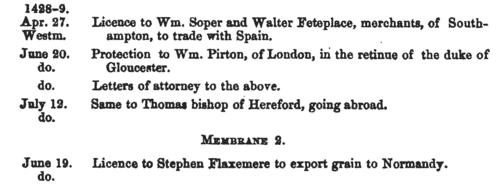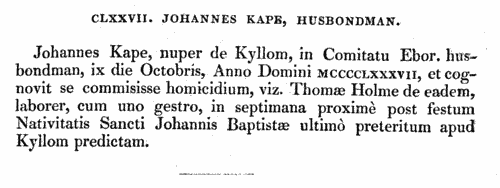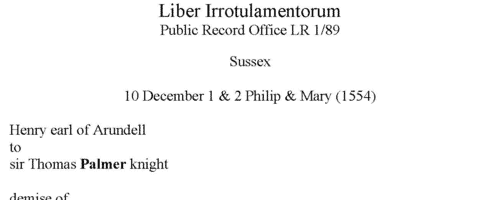Colwell Surname Ancestry ResultsOur indexes 1000-1999 include entries for the spelling 'colwell'. In the period you have requested, we have the following 207 records (displaying 1 to 10): Single Surname Subscription | | | Buying all 207 results of this search individually would cost £1,184.00. But you can have free access to all 207 records for a year, to view, to save and print, for £100. Save £1,084.00. More... |
These sample scans are from the original record. You will get scans of the full pages or articles where the surname you searched for has been found. Your web browser may prevent the sample windows from opening; in this case please change your browser settings to allow pop-up windows from this site. Close Rolls
(1343-1346)
The close rolls of the 17th, 18th and 19th years of the reign of king Edward III record the main artery of government administration in England, the orders sent out day by day to individual officers, especially sheriffs of shires: they are an exceptionally rich source for so early a period. There is also some material relating to Wales, Scotland, Ireland and the English possessions in France.COLWELL. Cost: £4.00.  | Sample scan, click to enlarge

| Close Rolls
(1441-1447)
The close rolls of the 20th to 25th years of the reign of king Henry VI record the main artery of government administration in England, the orders sent out day by day to individual officers, especially sheriffs of shires: they are an exceptionally rich source for so early a period. There is also some material relating to Wales, Scotland, Ireland and the English possessions in France. COLWELL. Cost: £4.00.  | Sample scan, click to enlarge

| The English in France
(1449)
King Henry VI of England (one of the grandsons of Charles VI of France) claimed the throne of France (and quartered the fleurs-de-lis of France with the lions of England on the royal standard) as had his predecessors since Edward III, as descendants of Philip IV of France. The English had real power or influence in Brittany, Normandy, Flanders and Gascony, and actual possession of several coastal garrisons, in particular Calais, where the French inhabitants had been replaced by English. Henry VI came to the throne only seven years after his father had trounced the French at Agincourt; but his cousin, Charles VII, who became king of France in the same year, spent his long reign rebutting the English king's claim to his throne by territorial reconquest and consolidation. The English administration kept a series of records called the French Rolls. On these are recorded royal appointments and commissions in France; letters of protection and safe-conduct to soldiers, merchants, diplomats and pilgrims travelling to France from England and returning, and to foreign legations. There are also licences to merchants to export to the Continent, and to captains to transport pilgrims. As Henry VI's reign progressed, and the English grip on northern France loosened, the French Rolls also increasingly include entries concerning the ransoming of English prisoners.COLWELL. Cost: £6.00.  | Sample scan, click to enlarge

| Lichfield Diocese Ordinations: Deacons Secular
(1508)
The diocese of Coventry and Lichfield at this period included the whole of Cheshire, Staffordshire and Derbyshire; all Lancashire south of the Ribble; northern Shropshire (including Shrewsbury); and northern Warwickshire (including Birmingham and Coventry). Ordinations took place on the four Ember Saturdays in the year, and on certain other occasions; lists of ordinands to the degrees of acolyte, subdeacon, deacon and priest were preserved in the ordination registers, a distinction being made between those clerks who were 'regular', i. e., monks, friars, &c., and those who were 'secular', the main body of the clergy. All ordinands were celibate, and those regular, and the secular who obtained benefices, remained so, but only a minority of the secular ordinands ever obtained benefices, and most will doubtless have married later in life. No man might be ordained to subdeacon or higher without proving either that he was of independent means or that he was sponsored by an institution or a gentleman. Most entries in the register of such ordinations therefore have the words 'ad titulum' followed by the name of the religious house that was the sponsor. This is an important indication of the man's origins - boys whose families were monastic tenants, and who were educated by the monks, would naturally be sponsored by the abbey. Only men who were born and bred in the diocese could be ordained by the bishop, unless producing letters dimissory from the bishop of the diocese of their birth. These are the ordinations celebrated on Ember Saturday, 23 September 1508, by Thomas, bishop of Panados (Pavados), suffragan of bishop Geoffrey Blythe, in Lichfield cathedral.COLWELL. Cost: £8.00.  | Sample scan, click to enlarge

| Lichfield Diocese Ordinations: Priests Secular
(1508)
The diocese of Coventry and Lichfield at this period included the whole of Cheshire, Staffordshire and Derbyshire; all Lancashire south of the Ribble; northern Shropshire (including Shrewsbury); and northern Warwickshire (including Birmingham and Coventry). Ordinations took place on the four Ember Saturdays in the year, and on certain other occasions; lists of ordinands to the degrees of acolyte, subdeacon, deacon and priest were preserved in the ordination registers, a distinction being made between those clerks who were 'regular', i. e., monks, friars, &c., and those who were 'secular', the main body of the clergy. All ordinands were celibate, and those regular, and the secular who obtained benefices, remained so, but only a minority of the secular ordinands ever obtained benefices, and most will doubtless have married later in life. No man might be ordained to subdeacon or higher without proving either that he was of independent means or that he was sponsored by an institution or a gentleman. Most entries in the register of such ordinations therefore have the words 'ad titulum' followed by the name of the religious house that was the sponsor. This is an important indication of the man's origins - boys whose families were monastic tenants, and who were educated by the monks, would naturally be sponsored by the abbey. Only men who were born and bred in the diocese could be ordained by the bishop, unless producing letters dimissory from the bishop of the diocese of their birth. These are the ordinations celebrated on Ember Saturday, 23 December 1508, by Thomas bishop of Panados (Pavados), suffragan of bishop Geoffrey Blythe, in Lichfield cathedral.COLWELL. Cost: £8.00.  | Sample scan, click to enlarge

| Inhabitants of Suffolk
(1524)
The lay subsidy granted by Act of Parliament in 1523 was a tax on the laymen (as opposed to clergy), levied on householders, landowners, those possessing moveable goods worth £1 or more, and all workmen aged 16 or over earning £1 or more per annum. Real estate was taxed at a shilling in the pound; moveable goods worth £1 to £2 at fourpence a pound; £2 to £20 at sixpence a pound; and over £20 at a shilling in the pound. Wages were taxed at fourpence in the pound. Aliens were charged double; aliens not chargeable in the above categories had to pay a poll tax of eightpence. The records of the assessment for the county of Suffolk, mostly made in 1524, survive in 64 rolls in the National Archives. From 42 of these a compilation for the whole shire was printed in 1910 as Suffolk Green Book x. This includes a list of defaulters of 1526 and a subsidy roll of 1534 for Bury St Edmunds.COLWELL. Cost: £4.00.  | Sample scan, click to enlarge

| London Liverymen: Salters
(1537)
J. Caley, F.R.S., F.S.A. transcribed this 'curious record' found in the Chapter House, Westminster, 'a list of the freemen of the various companies resident in London and Westminster; from Thomas Lewyn being mentioned as sheriff, it appears it was made in the year 1537.' Thirty-seven companies are listed, comprising 2400 individuals: Armourers, Bakers, Barber Surgeons, Blacksmiths, Brewers, Broiderers, Clothworkers, Coopers, Cordwainers, Curriers, Cutlers, Drapers, Fishmongers, Fletchers, Founders, Freemasons, Fruiterers, Goldsmiths, Grocers, Haberdashers, Innholders, Ironmongers, Joiners, Leather Sellers, Merchant Taylors, Painter Stainers, Plasterers, Plumbers, Saddlers, Salters, Skinners, Spurriers, Tallow Chandlers, Tilers, Vintners, Wax Chandlers and Weavers. COLWELL. Cost: £6.00.  | Sample scan, click to enlarge

| Murderers sheltering in Beverley Minster: and their victims
(1478-1539)
Criminals could evade pursuit by claiming sanctuary in the church of St John in Beverley, in the East Riding of Yorkshire. This liberty of the minster extended a league in every direction from the church door, and was divided into six sections, each giving greater sanctity to the rights of sanctuary, the sixth and innermost section being the presbitery or chancel. Near the altar there was a stone chair called the Frith Stool, seated on which an accused could claim total immunity. The bailiff would receive the oath of the fugitive, and a clerk recorded 'what man he killed, and wher with, and both ther namez'; the bailiff receiving a fee of 2s 4d, the clerk 4d. Sanctuary was afforded for 30 days, with food and lodging, after which the fugitive was protected to the borders of the county. But within 40 days he had to appear before the coroner, clothed in sackcloth, and be branded on his right hand with the sign of the letter A. This signified that he was swearing to abjure the realm: he was then free to leave the country unhindered. At Beverley the clerks kept a separate register of fugitives' petitions, which survives from 1478 to 1539 in Harleian Manuscript 560. It was edited and printed by the Surtees Society in 1837 under the title Sanctuarium Beverlacense. Some of the criminals came from a considerable distance: the great majority were murderers or homicides. Each entry usually gives full name, original address, (often) trade, a brief description of the crime, often with date, and usually the name of the victim. This index covers all the surnames given.COLWELL. Cost: £4.00.  | Sample scan, click to enlarge

| Freemen of London
(1540-1550)
The long series of mediaeval registers and books of admission of the freemen of London was destroyed by fire in 1786. Thirty surviving charred leaves were gathered together and rebound, becoming Egerton MS 2408 in the British Museum. The order is jumbled and generally speaking none can be dated with certainty, although all belong to the very end of the reign of Henry VIII and the start of the reign of his son, Edward VI. These are pages from the admission books. Each entry here usually gives the name of the person admitted to the freedom; his father's name, address and occupation; his entitlement to the freedom, usually by having served out an apprenticeship to a citizen, naming the master and his trade. Then there may follow a cross-reference to M. or N., being two volumes of another set of official books denoted by the letters of the alphabet, and following each other in chronological sequence, which evidently gave details of entries into apprenticeships. These other books no longer exist: but the dates given for entry do identify the start of the apprenticeship, and so give by implication a date for the eventual admission to freedom. In the margin is the name of the city ward and the total of the fee and fine paid on admission.COLWELL. Cost: £4.00.  | Sample scan, click to enlarge

| Owners and Tenants in Kent (1553)
Owners and tenants mentioned in deeds of grants and leases of lands, houses and offices registered in the Liber Irrotulamentorum.
COLWELL. Cost: £8.00.  | Sample scan, click to enlarge

|
Research your ancestry, family history, genealogy and one-name study by direct access to original records and archives indexed by surname.
|












